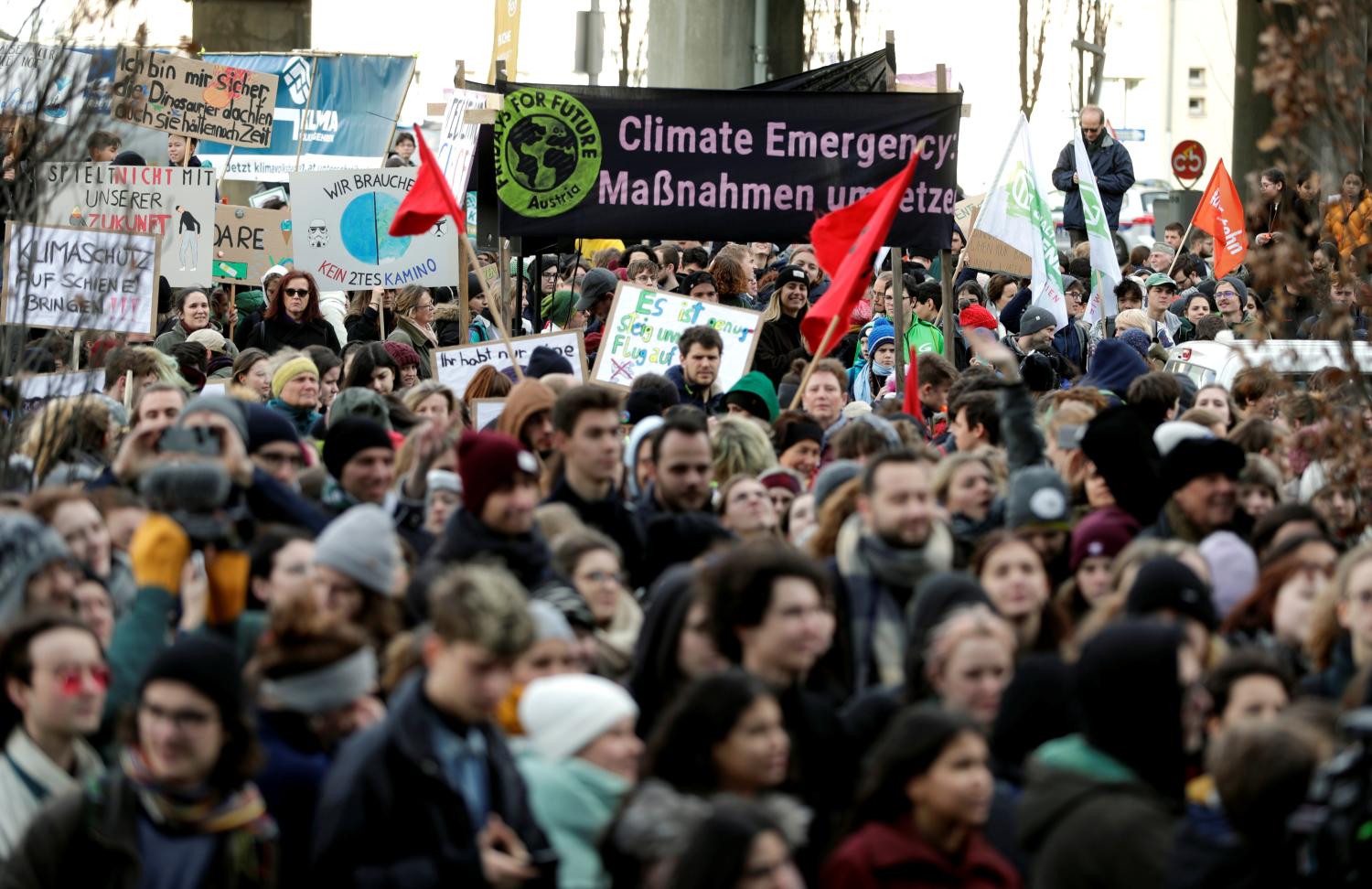2019 was marked by massive protest movements in a number of different countries, impeachment, continued Brexit talks and upheaval in global trade, and much more. Already, 2020 is shaping up to be no less eventful as the U.S. gears up for presidential elections in November.
Brookings experts are looking ahead to the issues they expect will shape the world this year and the solutions to address them. Below, explore what our experts have identified as the biggest policy issues in their field for 2020, the ideas or proposals they encourage policymakers to consider, and the overlooked stories that deserve greater attention.
Related Content

January 7, 2020
The U.S. military prioritizing strategy in the Middle East over great power competition with China and Russia – Mara Karlin
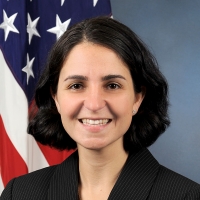 Despite a widely lauded National Defense Strategy prioritizing great power competition vis-à-vis China and Russia, the U.S. military is getting deeper in Middle East purgatory by sending thousands and thousands more troops to the region. The clock is ticking for the Pentagon to prioritize before it is too late.
Despite a widely lauded National Defense Strategy prioritizing great power competition vis-à-vis China and Russia, the U.S. military is getting deeper in Middle East purgatory by sending thousands and thousands more troops to the region. The clock is ticking for the Pentagon to prioritize before it is too late.
Mara Karlin
Nonresident Senior Fellow, Foreign Policy
Increased efforts to combat online hate speech and reduce violence – Daniel Byman
 There is a growing recognition that white supremacist violence is often as dangerous to the United States and its allies as are jihadist attacks. The United States needs more aggressive intelligence and law enforcement efforts at home, which will require additional resources. The United States also needs to coordinate more with allies around the world, as some groups are transnational and such cooperation offers additional opportunities for disruption. Because these groups rely heavily on social media platforms, coordination with (and at times regulation of) the technology sector is also vital.
There is a growing recognition that white supremacist violence is often as dangerous to the United States and its allies as are jihadist attacks. The United States needs more aggressive intelligence and law enforcement efforts at home, which will require additional resources. The United States also needs to coordinate more with allies around the world, as some groups are transnational and such cooperation offers additional opportunities for disruption. Because these groups rely heavily on social media platforms, coordination with (and at times regulation of) the technology sector is also vital.
Daniel Byman
Senior Fellow, Foreign Policy
President Trump’s appointment of federal judges to reshape the judicial system – Russell Wheeler
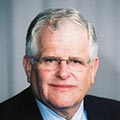 How many federal judges will leave active status, creating vacancies for which the administration can submit nominees for near-certain Senate confirmation in Trump’s fourth and perhaps final year in office? With a single appellate vacancy in mid-December 2019, Trump needs more vacancies to continue reshaping the party-of-appointing-president balance on the appellate courts beyond the record 50 judges appointed so far (31 of them replacing Republican appointees). Especially if a Democratic White House victory looks likely, Republican-appointed judges eligible to retire may rush to the exits while Trump can replace them, but Democratic appointees may be more likely to stay put.
How many federal judges will leave active status, creating vacancies for which the administration can submit nominees for near-certain Senate confirmation in Trump’s fourth and perhaps final year in office? With a single appellate vacancy in mid-December 2019, Trump needs more vacancies to continue reshaping the party-of-appointing-president balance on the appellate courts beyond the record 50 judges appointed so far (31 of them replacing Republican appointees). Especially if a Democratic White House victory looks likely, Republican-appointed judges eligible to retire may rush to the exits while Trump can replace them, but Democratic appointees may be more likely to stay put.
Russell Wheeler
Visiting Fellow, Governance Studies
“Techlash” is changing how AI is deployed and used – Darrell West
 One big policy development to watch in 2020 is the “techlash” that has developed against some technology applications. For example, AI has been deployed in health care, education, transportation, e-commerce, and national defense, and has raised several public concerns about privacy, human control, and bias. But the good news is that humans will determine the technology future through upcoming policy and operational decisions. Among the ways people can maintain control is to establish guiding ethical principles, strengthen oversight, create advisory boards of relevant stakeholders for federal agencies, reduce algorithmic biases through third-party audits, and penalize malicious abuses of emerging technologies.
One big policy development to watch in 2020 is the “techlash” that has developed against some technology applications. For example, AI has been deployed in health care, education, transportation, e-commerce, and national defense, and has raised several public concerns about privacy, human control, and bias. But the good news is that humans will determine the technology future through upcoming policy and operational decisions. Among the ways people can maintain control is to establish guiding ethical principles, strengthen oversight, create advisory boards of relevant stakeholders for federal agencies, reduce algorithmic biases through third-party audits, and penalize malicious abuses of emerging technologies.
Darrell M. West
Vice President and Director, Governance Studies
How the UK’s decision to leave the EU and Turkey’s relationship with the US will unfold – Amanda Sloat
 United Kingdom: With the UK set to leave the European Union on January 31, the two sides will spend 2020 in contentious negotiations over their future relationship. Domestically, attention will focus on Northern Ireland (including efforts to resurrect the Stormont Assembly) and Scotland (amid calls for a second independence referendum).
United Kingdom: With the UK set to leave the European Union on January 31, the two sides will spend 2020 in contentious negotiations over their future relationship. Domestically, attention will focus on Northern Ireland (including efforts to resurrect the Stormont Assembly) and Scotland (amid calls for a second independence referendum).
Turkey: The U.S. and Turkey are on a collision course, amid an escalating series of actions and retaliations related to Ankara’s purchase of Russian defense equipment and Washington’s cooperation with YPG fighters in Syria. Tensions will increase in 2020 unless both sides take steps to limit the damage and preserve relations.
Amanda Sloat
Robert Bosch Senior Fellow, Foreign Policy
China’s competition with the U.S. and Taiwan for influence in Latin America – Ted Piccone
 The growing instability, economic and social malaise, and political fragmentation in Latin America and the Caribbean are likely to widen the field for Chinese influence and competition with the United States and Taiwan. Will the region continue on a pragmatic course of (mostly) good relations with both Washington and Beijing? And how will the ongoing crisis in Venezuela be resolved?
The growing instability, economic and social malaise, and political fragmentation in Latin America and the Caribbean are likely to widen the field for Chinese influence and competition with the United States and Taiwan. Will the region continue on a pragmatic course of (mostly) good relations with both Washington and Beijing? And how will the ongoing crisis in Venezuela be resolved?
Ted Piccone
Nonresident Senior Fellow, Foreign Policy
High housing costs are negativly effecting U.S. families – Jenny Schuetz
 High housing costs are taking a toll on U.S. families, stressing their pocketbooks, their time, and their communities. The Trump administration and local governments (especially in blue cities) are clashing over approaches to reduce homelessness. Meanwhile, middle-class households are struggling to pay the rent, and demanding that elected officials do more to help.
High housing costs are taking a toll on U.S. families, stressing their pocketbooks, their time, and their communities. The Trump administration and local governments (especially in blue cities) are clashing over approaches to reduce homelessness. Meanwhile, middle-class households are struggling to pay the rent, and demanding that elected officials do more to help.
Jenny Schuetz
Fellow, Metropolitan Policy Program
A polarized political environment will impact participation in the 2020 Census – William H. Frey
 In tracking the 2020 Census, I will be following forces that could lead to a selective under-enumeration of different demographic groups. The census provides population data for congressional reapportionment and redistricting as well as for distributing funds from federal programs. There are concerns that despite strong outreach efforts by the Census Bureau and others, the current political environment could lead to high non-responses for Hispanics, immigrants, and other groups who are fearful that their information will be shared with law enforcement. This is also the first census to encourage an internet response which will be worth monitoring for different segments of the population.
In tracking the 2020 Census, I will be following forces that could lead to a selective under-enumeration of different demographic groups. The census provides population data for congressional reapportionment and redistricting as well as for distributing funds from federal programs. There are concerns that despite strong outreach efforts by the Census Bureau and others, the current political environment could lead to high non-responses for Hispanics, immigrants, and other groups who are fearful that their information will be shared with law enforcement. This is also the first census to encourage an internet response which will be worth monitoring for different segments of the population.
William H. Frey
Senior Fellow, Metropolitan Policy Program
Building policies to support employment for formerly incarcerated individuals – Annelies Goger
 A critical policy issue for 2020 is the need to increase support for formerly incarcerated individuals in their transitions to employment. With the First Step Act and other justice-related reforms, an unprecedented number of individuals will be released in the coming years—producing a large reserve of untapped talent in a tight labor market. However, we have yet to remove demand-side barriers to employment and to adequately prepare individuals for a smooth transition. Policymakers can build on promising practices such as “ban the box” or using technologies, such as Virtual Reality, to prepare individuals for life on the outside.
A critical policy issue for 2020 is the need to increase support for formerly incarcerated individuals in their transitions to employment. With the First Step Act and other justice-related reforms, an unprecedented number of individuals will be released in the coming years—producing a large reserve of untapped talent in a tight labor market. However, we have yet to remove demand-side barriers to employment and to adequately prepare individuals for a smooth transition. Policymakers can build on promising practices such as “ban the box” or using technologies, such as Virtual Reality, to prepare individuals for life on the outside.
Annelies Goger
David M. Rubenstein Fellow, Metropolitan Policy Program
What the mass uprisings in the Middle East mean for governance in the region – Sharan Grewal
 In 2020, I will be watching how the “second Arab Spring” develops. In 2019, mass protests reemerged through the Middle East, including in Sudan, Algeria, Egypt, Lebanon, Iraq, and Iran. Having learned from previous attempts, protesters have remained mobilized even after toppling governments and remained peaceful even in the face of repression. How these mass uprisings unfold will be the top story in 2020.
In 2020, I will be watching how the “second Arab Spring” develops. In 2019, mass protests reemerged through the Middle East, including in Sudan, Algeria, Egypt, Lebanon, Iraq, and Iran. Having learned from previous attempts, protesters have remained mobilized even after toppling governments and remained peaceful even in the face of repression. How these mass uprisings unfold will be the top story in 2020.
Sharan Grewal
Visiting Fellow, Foreign Policy Program
Italy’s technology and foreign policy advancements – Giovanna De Maio
 1) I will be looking at Italy-China relations following the signing of the MoU on the Belt and Road Initiative (March 2019) and understand how Italy will cope with the challenges to national security posed by 5G technology.
1) I will be looking at Italy-China relations following the signing of the MoU on the Belt and Road Initiative (March 2019) and understand how Italy will cope with the challenges to national security posed by 5G technology.
2) As in 2019 Italy’s foreign policy was scattershot in light of the tensions between nationalist League and populist Five Star, in 2020 I will be watching the foreign policy of the new government coalition made of Five Star and the Leftist Democratic Party; also, I will be monitoring nationalist/far right parties in Italy that are likely to return into power should the government collapse, and at their connections with other far right movements around the world.
Giovanna De Maio
Visiting Fellow, Foreign Policy Program
What does the U.S.-China trade deal mean for investment and technology? – David Dollar
 Despite the phase 1 U.S.-China trade deal, most of the tariffs imposed by each side remain in place. In addition, the U.S. has imposed restrictions on Chinese investment and technology cooperation. The big story this year will not be trade, but rather investment and technology. Will the U.S. craft investment and technology restrictions that are narrowly targeted to national security issues, or will it introduce much broader limitations on engagement between the two?
The U.S. needs to work much more closely with allies in crafting an economic strategy toward China. Without support from major allies, U.S. efforts to limit investment and technology cooperation with China will end up isolating the U.S., not China.
Despite the phase 1 U.S.-China trade deal, most of the tariffs imposed by each side remain in place. In addition, the U.S. has imposed restrictions on Chinese investment and technology cooperation. The big story this year will not be trade, but rather investment and technology. Will the U.S. craft investment and technology restrictions that are narrowly targeted to national security issues, or will it introduce much broader limitations on engagement between the two?
The U.S. needs to work much more closely with allies in crafting an economic strategy toward China. Without support from major allies, U.S. efforts to limit investment and technology cooperation with China will end up isolating the U.S., not China.
David Dollar
Senior Fellow, Foreign Policy Program
Countering the spread of disinformation by foreign governments – Alina Polyakova
 As the 2020 election approaches, policymakers should take concrete steps to counter and build resilience against foreign disinformation operations, most notably from Russia. The U.S. lags behind our European allies in addressing this challenge, both conceptually and operationally.
As the 2020 election approaches, policymakers should take concrete steps to counter and build resilience against foreign disinformation operations, most notably from Russia. The U.S. lags behind our European allies in addressing this challenge, both conceptually and operationally.
Alina Polyakova
Director, Project on Global Democracy and Emerging Technology
Fellow, Foreign Policy Program
How the world addresses climate change through shared goals – John McArthur
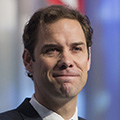 The year 2020 will see a triple-test of the world’s ability to cooperate toward a shared future. In September, the United Nations will mark its 75th anniversary, underlined by calls for a “Decade of Action” to achieve the universally-agreed Sustainable Development Goals by 2030. In October, China will host a pivotal summit of the Convention on Biological Diversity, setting the global agenda for protecting (or not) the world’s living species and ecosystems. Then, November will see a major climate check-point summit in Glasgow, Scotland, where countries will bring their updated strategies for tackling the greenhouse gas challenge.
The year 2020 will see a triple-test of the world’s ability to cooperate toward a shared future. In September, the United Nations will mark its 75th anniversary, underlined by calls for a “Decade of Action” to achieve the universally-agreed Sustainable Development Goals by 2030. In October, China will host a pivotal summit of the Convention on Biological Diversity, setting the global agenda for protecting (or not) the world’s living species and ecosystems. Then, November will see a major climate check-point summit in Glasgow, Scotland, where countries will bring their updated strategies for tackling the greenhouse gas challenge.
John McArthur
Senior Fellow, Global Economy and Development Program
Congress’ ability to pass a bipartisan, comprehensive privacy bill – Cameron F. Kerry
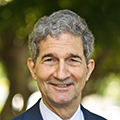 This time last year, I wondered if 2019 would be the year that Congress passed comprehensive privacy legislation. Since then, key stakeholders and policymakers came together to discuss privacy provisions, House and Senate committees held multiple privacy hearings, and, as the year came to a close, Senate Commerce Committee leaders from both parties proposed legislation. Although Senate Commerce Chairman Roger Wicker (R-Miss.) once expressed the desire to pass legislation by end of 2019, that did not happen and the California Consumer Privacy Act took effect as scheduled on January 1, 2020. Even though 2019 was not the year, I remain hopeful that a passable bipartisan privacy bill in 2020 is not only possible—it is promising.
This time last year, I wondered if 2019 would be the year that Congress passed comprehensive privacy legislation. Since then, key stakeholders and policymakers came together to discuss privacy provisions, House and Senate committees held multiple privacy hearings, and, as the year came to a close, Senate Commerce Committee leaders from both parties proposed legislation. Although Senate Commerce Chairman Roger Wicker (R-Miss.) once expressed the desire to pass legislation by end of 2019, that did not happen and the California Consumer Privacy Act took effect as scheduled on January 1, 2020. Even though 2019 was not the year, I remain hopeful that a passable bipartisan privacy bill in 2020 is not only possible—it is promising.
Cameron F. Kerry
Ann R. and Andrew H. Tisch Distinguished Visiting Fellow, Governance Studies Program
China’s efforts to assert itself as the global superpower – William Burke-White
 This year China will take its claims to institutional leadership global, seizing political space afforded by U.S. retrenchment under President Trump and more actively shaping global institutions to its interests. China has already established its place at the center of Asian institutional architecture, such as the BRICs Bank and the One Belt One Road program. In 2020, China’s efforts to assert authority will turn to key global institutions. At the United Nations, China will be more aggressive in exercising its veto. At the World Trade Organization, it will take advantage of U.S. stonewalling on judicial appointments to build new political coalitions. In climate negotiations, the U.S. withdrawal from the Paris Agreement will leave China the loudest voice in an institution devoid of state leadership.
This year China will take its claims to institutional leadership global, seizing political space afforded by U.S. retrenchment under President Trump and more actively shaping global institutions to its interests. China has already established its place at the center of Asian institutional architecture, such as the BRICs Bank and the One Belt One Road program. In 2020, China’s efforts to assert authority will turn to key global institutions. At the United Nations, China will be more aggressive in exercising its veto. At the World Trade Organization, it will take advantage of U.S. stonewalling on judicial appointments to build new political coalitions. In climate negotiations, the U.S. withdrawal from the Paris Agreement will leave China the loudest voice in an institution devoid of state leadership.
William Burke-White
Visiting Fellow, Foreign Policy Program
Developing a retrospective narrative of the Afghan war as the U.S withdraws troops– Madiha Afzal
 In 2020, the U.S. withdrawal from Afghanistan and the shape of the Afghan peace process will be a key issue to watch. As some recent reporting looking back on the Afghan war and the rhetoric of “endless war” has made clear, the American narrative on the war in Afghanistan remains incomplete. In 2020, erstwhile and current government and military officials should work to reclaim this narrative—acknowledging both missteps and failures, the war’s shifting goals and successes. This will both help America and the world reckon with the war and form an ever more necessary retrospective on it.
In 2020, the U.S. withdrawal from Afghanistan and the shape of the Afghan peace process will be a key issue to watch. As some recent reporting looking back on the Afghan war and the rhetoric of “endless war” has made clear, the American narrative on the war in Afghanistan remains incomplete. In 2020, erstwhile and current government and military officials should work to reclaim this narrative—acknowledging both missteps and failures, the war’s shifting goals and successes. This will both help America and the world reckon with the war and form an ever more necessary retrospective on it.
Madiha Afzal
David M. Rubenstein Fellow , Foreign Policy Program
The fight to shift away from natural gas for decarbonization – Timmons Roberts
 The window for profound action that assures a stable global climate system is rapidly closing; the science suggests deep annual drops in emissions of greenhouse gases are needed. This means a complete transition off of burning fossil fuels is required, most to be completed this decade.
The window for profound action that assures a stable global climate system is rapidly closing; the science suggests deep annual drops in emissions of greenhouse gases are needed. This means a complete transition off of burning fossil fuels is required, most to be completed this decade.
Much of the improvement in reported emissions from the United States has been due to the shift from coal to natural gas, made cheap and plentiful by hydraulic fracturing, or “fracking.” This has its own environmental concerns, but the dependence of the economy now on gas risks lock-in to systems of pipes that leak. Eighty percent of natural gas is methane, which is 86 times worse than carbon dioxide for the climate in the short term.
This will be the decade when we have to develop and carry out plans to shut off the gas and switch homes to electric heat pumps and other processes to electricity. Expect knock-down drag-out fights on this, and some surprising alliances to get decarbonization done. Utilities will be pivotal: they can stand with fossil dependence or lead the transition.
Timmons Roberts
Nonresident Senior Fellow, Global Economy and Development
The Brookings Institution is committed to quality, independence, and impact.
We are supported by a diverse array of funders. In line with our values and policies, each Brookings publication represents the sole views of its author(s).
